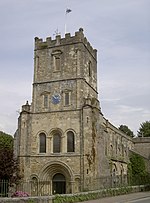Pennsylvania Fields, Sedbury
English Site of Special Scientific Interest stubsSites of Special Scientific Interest in GloucestershireSites of Special Scientific Interest notified in 1985Tidenham

Pennsylvania Fields, Sedbury (grid reference ST542929) is a 27.03-hectare (66.8-acre) biological Site of Special Scientific Interest in Gloucestershire, notified in 1985.The site is listed in the 'Forest of Dean Local Plan Review' as a Key Wildlife Site (KWS).
Excerpt from the Wikipedia article Pennsylvania Fields, Sedbury (License: CC BY-SA 3.0, Authors, Images).Pennsylvania Fields, Sedbury
Bridget Drive, Forest of Dean Tidenham
Geographical coordinates (GPS) Address Nearby Places Show on map
Geographical coordinates (GPS)
| Latitude | Longitude |
|---|---|
| N 51.633488 ° | E -2.662415 ° |
Address
Bridget Drive
Bridget Drive
NP16 7AR Forest of Dean, Tidenham
England, United Kingdom
Open on Google Maps








